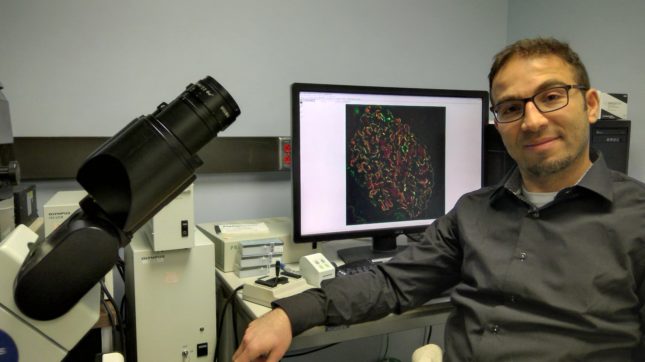Congratulations are in order for two young investigators in the Division of Nephrology who have been awarded AWRP Summer 2016 Scientist Development Grants from the American Heart Association (AHA). These grants are intended to help promising, beginning scientists bridge the gap from completion of their research training to becoming an independent investigator.
Yong-Feng Gong, PhD, Instructor of Medicine, and Hani Suleiman, MD, PhD, Instructor of Medicine, will be receiving the three-year, $77,000/year grants. Funding begins January 1, 2017.
The focus of Dr. Gong’s grant (Claudin, Chloride Metabolism and Blood Pressure Regulation) is to investigate how chloride metabolism by the kidney contributes to blood pressure regulation. “Understanding regulation of chloride transport is of great significance for understanding hypertension, heart failure, and stroke. Up until very recently, it has been a poorly studied field,” says Dr. Gong. “The overall goal of my work is to elucidate the cellular signaling pathways that regulate renal paracellular chloride transport in response to physiologic and pathologic conditions. Chloride disposition, like sodium, plays an important role in the regulation of blood pressure and extracellular fluid volume status. My project has the potential to advance our knowledge of renal transport function and basic tight junction biology. Such knowledge will facilitate the development of therapeutic tools acting to adjust tight junction permeability particularly important for treating diseases such as hypertension and stroke and for transiently opening or closing the blood-brain barriers.”

Yong-feng Gong, PhD
Dr. Suleiman’s proposal (Super-resolution Imaging of the Contractile Apparatus of the Kidney Podocytes) utilizes genetic approaches and cutting-edge imaging methods, including revolutionary super-resolution microscopic techniques, to study certain important features of injured podocytes. “Podocytes are unique cells found in glomeruli, the parts of the kidney that filter the blood. Podocyte injury harms the kidney filter and is the culprit in many glomerular diseases, such as minimal change disease, focal segmental glomerulosclerosis and diabetic nephropathy. Current therapeutic approaches are frequently unable to stop the progression of these diseases to kidney failure, a serious condition that requires dialysis or kidney transplant. Proper understanding of how podocytes work will allow us to develop better therapies for these diseases.” Suleiman has observed a dramatic shift in the localization of intracellular contractile cables in injured podocytes. “I will investigate what causes this shift.”
The American Heart Association has spent more than $4 billion on research since 1949. In 2015-16, AHA funded 980 new research awards. More information on the Scientist Development Grants can be found here. The next application deadline is February 14, 2017, with award activation July 1, 2017.
